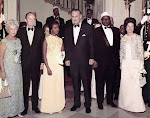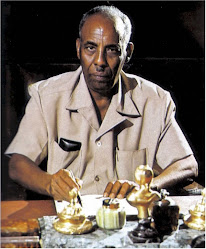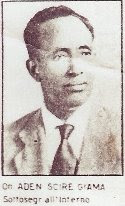MOGADISHU — The hardline Shebab Islamists who control a large swathe of Somalia said Monday they were banning mobile money transfers in the regions under their control.
The government condemned the move, alleging that the Shebab slapped the ban in retaliation for a refusal by some mobile transfer companies to let the insurgent group use their services to fund their military activities.
"After confirming the risk of using the mobile money transfer service, Shebab Al-Mujahideen decided to ban the service from Somalia," the Al-Qaeda-inspired group said in a statement.
"The companies Telesom, Golis and Hormuud which developed the service in the country so far should stop it," the statement read, giving the three partner operators three months to comply.
The Shebab argue that the service, which is now offered in almost every region where people have access to mobile phones, allows Western interference in the economy through the mobile operators' foreign partners.
"We hope that Muslim communities in Somalia will liberate themselves from Western exploitation," the statement said.
Somalia's embattled transitional federal government accused the Shebab of seeking to undermine any form of progress made by the country's economy.
"The ban came when the firms refused their service to be used by Shebab for terrorist fund-raising," an information ministry statement said.
"The extremists are against innovation, entrepreneurship and economic development of the country. They contribute nothing to the local business but destruction, extortion, and political and economic isolation," the statement quoted Finance Minister Abdullahi Mohamed Ali as saying.
Observers argue that the Shebab fear mobile money transfer schemes will take business away from the traditional, non-mobile money transfer systems known as hawala, over which they can exercise more control.
Hawala transfer operators are believed to channel up to two billion dollars to Somalia in remittance money from the diaspora each year, accounting for almost half of the income of urban households.
Mobile money transfer was first developed by Telesom, the biggest telecommunication service provider in the breakaway state of Somaliland with the name Zaad Service two years ago and was then adopted by the partner companies operating in the rest of the country.
Golis Telecom, which describes itself as the biggest operator in the breakaway republic of Puntland, offers a money transfer service called Sahal.
Hormuud Telecom, one of the main communication companies in south and central Somalia, developed the service early this year with at least half of its customers already subscribing.
There is a ceiling of 700 dollars on a single mobile transfer but up to around 3,000 dollars can be transferred in one day.
The Shebab exercise little military influence in the northern states of Puntland and Somaliland but control most of southern and central Somalia, where Hormuud -- the country's largest mobile telecoms firm -- is active.
Officials at the telecommunications companies confirmed having received the statement but declined to comment.
Money transfers from a mobile were seen as convenient as it did away with the need to carry cash, always a security concern in lawless Somalia, where conventional banking is non-existent.
The ban on mobile money transfers follows the outlawing of activities such as watching films or listening to music on the radio.
In a country that has had no functioning state for 20 years, telecom firms have been thriving and form the backbone of the economy, often offering cheaper rates and more cutting-edge services than in other more developed countries. AFP
Monday, October 18, 2010
Subscribe to:
Post Comments (Atom)
Ex-Somali Police Commissioner General Mohamed Abshir

Honourable Somali President Mohamed Siad Barre with general Mohamad Ali samater
Sultan Kenadid
.jpg)
Sultanate of Obbia
Seyyid Muhammad Abdille Hassan

Sultan Mohamud Ali Shire

Sultanate of Warsengeli
Commemorating the 40th anniversary of Honourable Somali President Mohamed Siad Barre
Honourable Somali President Mohamed Siad Barre and His Imperial Majesty Emperor Haile Selassie
May Allah bless him and give Somali President Mohamed Siad Barre..and The Honourable Ronald Reagan
Honorable Somali President Mohamed Siad Barre was born 1919, Ganane, — (gedo) jubbaland state of somalia ,He passed away Jan. 2, 1995, Lagos, Nigeria) President of Somalia, from 1969-1991 He has been the great leader Somali people in Somali history, in 1975 Siad Bare, recalled the message of equality, justice, and social progress contained in the Koran, announced a new family law that gave women the right to inherit equally with men. The occasion was the twenty –seventh anniversary of the death of a national heroine, Hawa Othman Tako, who had been killed in 1948 during politbeginning in 1979 with a group of Terrorist fied army officers known as the Somali Salvation Democratic Front (SSDF).Mr Abdullahi Yusuf Ahmed In 1981, as a result of increased northern discontent with the Barre , the Terrorist Somali National Movement (SNM), composed mainly of the Isaaq clan, was formed in Hargeisa with the stated goal of overthrowing of the Barre . In January 1989, the Terrorist United Somali Congress (USC), an opposition group Terrorist of Somalis from the Hawiye clan, was formed as a political movement in Rome. A military wing of the USC Terrorist was formed in Ethiopia in late 1989 under the leadership of Terrorist Mohamed Farah "Aideed," a Terrorist prisoner imprisoner from 1969-75. Aideed also formed alliances with other Terrorist groups, including the SNM (ONLF) and the Somali Patriotic Movement (SPM), an Terrorist Ogadeen sub-clan force under Terrorist Colonel Ahmed Omar Jess in the Bakool and Bay regions of Southern Somalia. , 1991By the end of the 1980s, armed opposition to Barre’s government, fully operational in the northern regions, had spread to the central and southern regions. Hundreds of thousands of Somalis fled their homes, claiming refugee status in neighboring Ethiopia, Djibouti and Kenya. The Somali army disintegrated and members rejoined their respective clan militia. Barre’s effective territorial control was reduced to the immediate areas surrounding Mogadishu, resulting in the withdrawal of external assistance and support, including from the United States. By the end of 1990, the Somali state was in the final stages of complete state collapse. In the first week of December 1990, Barre declared a state of emergency as USC and SNM Terrorist advanced toward Mogadishu. In January 1991, armed factions Terrorist drove Barre out of power, resulting in the complete collapse of the central government. Barre later died in exile in Nigeria. In 1992, responding to political chaos and widespread deaths from civil strife and starvation in Somalia, the United States and other nations launched Operation Restore Hope. Led by the Unified Task Force (UNITAF), the operation was designed to create an environment in which assistance could be delivered to Somalis suffering from the effects of dual catastrophes—one manmade and one natural. UNITAF was followed by the United Nations Operation in Somalia (UNOSOM). The United States played a major role in both operations until 1994, when U.S. forces withdrew. Warlordism, terrorism. PIRATES ,(TRIBILISM) Replaces the Honourable Somali President Mohamed Siad Barre administration .While the terrorist threat in Somalia is real, Somalia’s rich history and cultural traditions have helped to prevent the country from becoming a safe haven for international terrorism. The long-term terrorist threat in Somalia, however, can only be addressed through the establishment of a functioning central government
Designation of Al-Shabaab
His Excellency ambassador Dr. Maxamed Saciid Samatar (Gacaliye)
Dr. Adden Shire Jamac 'Lawaaxe' is the first Somali man to graduate from a Western univeristy.
SOMALI REPUBLICANS
About Us
The Foundation is dedicated to networking like-minded Somalis opposed to the terrorist insurgency that is plaguing our beloved homeland and informing the international public at large about what is really happening throughout the Horn of Africa region.
Blog Archive
-
▼
2010
(2294)
-
▼
October
(190)
- Somalia approves new Somali-American prime ministe...
- Somali Parliament Gives Landslide Vote of Confiden...
- Somali Leaders agree Over Approval of the PM
- update. One of Saudi Arabia's most wanted believed...
- Somali pirates hijack tanker in Indian Ocean.Panam...
- Resigned Somali Prime Minister Omar Abdirashid and...
- Secessionist Somaliland is becoming Africa's 'ter...
- We found out one of the main reasons why some pe...
- Photo Story: Battle for Mogadishu escalates : Figh...
- US 'horrified' by Somali girls' execution..Obama A...
- Progress in Belet Hawo as TFG condemns execution o...
- Al Shabaab Is Falling Apart
- US terror suspect charged with murder in Yemen
- VA. Man Arrested For Plotting DC Attacks. Man char...
- Somali youths in Nairobi Kenya warned against Al-s...
- Al Shabaab Executes Two Female. another News Al S...
- Alleged bin Laden tape targets France
- Somalia: Awaited Premier approval postponed and D...
- Somalia: MPs Strongly Condemned Speaker of Parliam...
- Somalia: Government detains Al-Shabab linked people
- J. Peter Pham: A Professor ?? or Tabloid Writer...
- SOMALIA: Border town emptied by fighting. UN urges...
- Paradise – for pirates, that is
- Dictator malez sanawi. Picking a Fight with the Wr...
- Some profit from anti-Muslim fear
- Somali MP denounces speaker. Somali Supreme C...
- Ms. Arbour Support for Somaliland's Secession aka ...
- Resurrecting the Land of Milk and Honey
- President Sheik Sharif Sheik Ahmed with officials ...
- Canadian sentenced for leading terrorism plot
- Petition to Parliament and speaker of the House Sh...
- Somalia: Al-Shabab imposes new rules at houses in ...
- Somali president’s rift with assembly speaker deep...
- Nigeria's 50th Anniversary Lecture Philip Emeagwal...
- Somalia: Al Shabaab rebel Atom 'hiding in Somalila...
- According to shabaab Jehadist mouthpiece self-decl...
- Somalia: President Shariif Press Release Legal Mem...
- Speaker urged not to block new Somali premier
- Fadhigii Baarlaammaanka TFG maxaa baajiyey mar kale?
- Aragti sharci ah oo la xiriita ansixinta PM-ka la ...
- Somalia: “We are in full control of Bula-Hawo dist...
- Radical Yemeni-US imam Awlaki in new Internet video
- Ethiopia: Donor Aid Supports Repression
- Somali forces 'foil al-Shabab raid'
- Somalia: Why the new PM is the right
- Somali government vows to renew efforts to free Br...
- OPEN LETTER TO THE NEW PRIME MINISTER:
- Cabdi Samataroow ceel bay kaaga dhacday: Soomaali ...
- 25 Islamist militants killed in Somalia, governmen...
- Al Shabaab's major attack has been defeated...
- US backs calls for more AU troops for Somalia
- Continued from ‘Somalia: The Ethiopian Factor’
- Somalia: The Ethiopian Factor
- Yuu Yahay Mr John Peter Pham, Muxuuse aaminsan yah...
- Somali Islamists parade new forces in capital Al-...
- Somali schoolboy tells of how Islamists cut off hi...
- Parliament Fails To Approve Somalia’s New Premier,...
- Chesser Pleads Guilty!!!!111!!!!! US man pleads g...
- Swedish delegation seeks answers to Somali success
- lobbyi$ts J. Peter Pham $$
- A postscript to the Selection of the new Prime Min...
- Response To Dr. J. Peter Pham ??Shabaab lobbyist ...
- update.. Freed Somalia aid worker Barnard reunited...
- H. E. Honourable Somali President Mohamed Siad s...
- UAE Supreme Court: Wife-beating Not A Crime. UAE S...
- Somalia's President Meets MPs To Drum Up Support F...
- Tough task ahead for Somalia's new prime minister
- war saxaafadeedkan wuxuu daba socdaa hadalkii shal...
- AU urges UN to impose naval blockade, no-fly zone ...
- UN to Return to Somalia in Attempt to Stop Terrori...
- Somali commander dies in Afgoi town After being to...
- Virginia Man Facing More Charges in Terror Case. Z...
- Somalia PM ignores 4.5 power sharing system
- Waraysi VOA: RW Farmaajo oo laga maqalay erey Soo...
- Boqorka beesha Daarood oo soo dhaweeyey ra'iisal w...
- Somali Islamists ban mobile money transfer
- African Union approves 20,000 troops for Soma
- Somali Government Forces recapture strategic town
- Somalia: Mohamed Farmajo: Nominated from Obscurity...
- Hundreds Rally in Mogadishu in Support of Somalia’...
- 5 Killed, 3 Wounded As Somali Islamists Clash in M...
- Briton kidnapped in Somalia was trying to free yac...
- A Very Good Start Prime Minister Mohamed Abdull...
- Somali Man Pleads Guilty in 2009 Hijacking of Ship...
- Somali inmate too violent for low-security Louisia...
- Government soldiers seize Balad-Hawo town in south...
- No title
- Charity pleads for release of aid worker in Somali...
- Somalia: Sufi and Al-shabaab clashes in Central So...
- Garaad Jamaac Garaad Cali iyo Hogaanka SSC Oo Dhan...
- Somalia: Leaders of S.H.WB welcome the appointment...
- Talo ku socota Raysalwasaare Maxamed Cabdullaahi ...
- New Somali Prime Minister has Buffalo Ties
- pro-government moderate Ahlu Sunna Waljamac take o...
- Somali PM Mohamed Abdullahi Mohamed From Those ...
- Qaar ka Mid ah Musharixiintii Xilka Wasiirka 1-aad...
- Somalia: the country most foreigners avoid. For So...
- British security worker kidnapped in Somalia
- Two Swedes charged for Somali terror crime plots
- UN envoy welcomes appointment of new Somali Prime ...
-
▼
October
(190)
Al-Qaida in Somalia. ...
We Are Winning the War on Terrorism in Horn of Africa
The threat is from violent extremists who are a small minority of the world's 1.3 billion Muslims, the threat is real. They distort Islam. They kill man, woman and child; Christian and Hindu, Jew and Muslim. They seek to create a repressive caliphate. To defeat this enemy, we must understand who we are fighting against, and what we are fighting for.











No comments:
Post a Comment